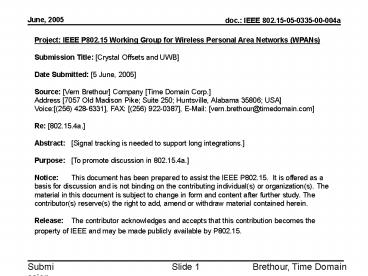IEEE 802.15 <subject> - PowerPoint PPT Presentation
Title:
IEEE 802.15 <subject>
Description:
Title: Slide 1 Subject: IEEE 802.15 : Author: vbrethour Description: Last modified by: vbrethour Created Date: 4/24/2005 8:54:04 PM Document presentation format – PowerPoint PPT presentation
Number of Views:27
Avg rating:3.0/5.0
Title: IEEE 802.15 <subject>
1
Project IEEE P802.15 Working Group for Wireless
Personal Area Networks (WPANs) Submission Title
Crystal Offsets and UWB Date Submitted 5
June, 2005 Source Vern Brethour Company
Time Domain Corp. Address 7057 Old Madison
Pike Suite 250 Huntsville, Alabama 35806
USA Voice(256) 428-6331, FAX (256)
922-0387, E-Mail vern.brethour_at_timedomain.com
Re 802.15.4a. Abstract Signal tracking
is needed to support long integrations. Purpose
To promote discussion in 802.15.4a. Notice Th
is document has been prepared to assist the IEEE
P802.15. It is offered as a basis for discussion
and is not binding on the contributing
individual(s) or organization(s). The material in
this document is subject to change in form and
content after further study. The contributor(s)
reserve(s) the right to add, amend or withdraw
material contained herein. Release The
contributor acknowledges and accepts that this
contribution becomes the property of IEEE and may
be made publicly available by P802.15.
2
Crystal offsets and UWB signals
- (The need for tracking in 15.4a receivers.)
3
We need process gain
- We are trying to keep our pulse amplitudes in
15.4a to voltages that we can generate with CMOS. - Pulse Compression helps.
- But it will not usually be enough.
4
We get process gain by integrating
- In Cairns, the 4a group decided to use path loss
exponent 3.5 for performance predictions. - The spreadsheet for 4a signaling (0245r1)
suggests the need for integrations as high as
8192 when path loss exponents of 3.5 are used.
5
We must stay roughly aligned on the pulse while
were integrating.
- But at 4.5 GHz, the pulses drift away in a hurry!
- Lets suppose that we need 30 dB of processing
gain from integration (reasonable for long links) - That means were integrating 1024 pulses.
6
Assume some typical values
- Pulse compression code length 19.
- Yet (even than) some folks still want large
pulses. - Makes the symbol get long. Well be looking at
symbol times like 870 ns. - An integration interval of 1024 of these symbols
will span .89 ms.
7
If we use 40 ppm crystals, we must budget for 80
ppm of total offset.
- Worst case is crystal 1 at 40 ppm crystal 2
at 40 ppm. - At 80 ppm we can drift 71 ps during a .89 ms
integration interval. - Thats a long way on a 4.5 GHz carrier!
8
71 ps of drift!
At 4.5 GHz, a whole cycle is only 222 ps
71 ps of drift will cause our sample point to
move from here at the start of the integration
interval to here at the end.
9
Thats not working!!
71 ps of drift will cause our sample point to
move from here at the start of the integration
interval to here at the end.
During this entire time (about a third of the
integration interval), the integration was
actually going the wrong way!
10
What does this mean?
This says that with 40ppm crystals we cannot use
integration of 1024 on a 4.5 GHz carrier unless
we are tracking. (In this example)
During this entire time (about a third of the
integration interval), the integration was
actually going the wrong way!
11
Does this mean we cant do long integrations?
- Of course not!
- It means that we must expect to track the
transmit signal with our receiver while were
integrating. - Thats just normal radio design.
12
Tracking with a UWB receiver.
- This is the reference receiver shown in
05-0246r1
Tracking logic here.
There are many options for implementing tracking
in a receiver. It can be done either completely
digitally or wholly in the analog world or as a
combination.
13
So fine! We do tracking. Does this mean we can
use whatever crystals we like?
- We must be careful.
- We are not tracking during acquisition.
- Yet we need process gain for long links (even in
acquisition).
14
Conclusion.
- We the 15.4a project moves forward and defines
the actual signaling that we will use we must pay
attention to the amount of time bounded by an
integration interval. - That may put bounds on the quality of crystals we
use.































